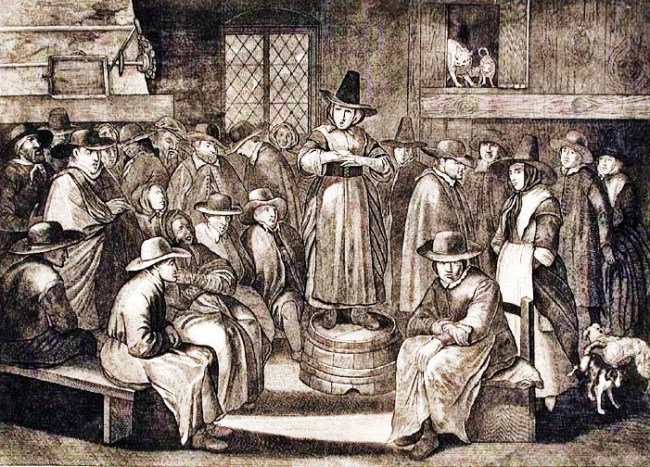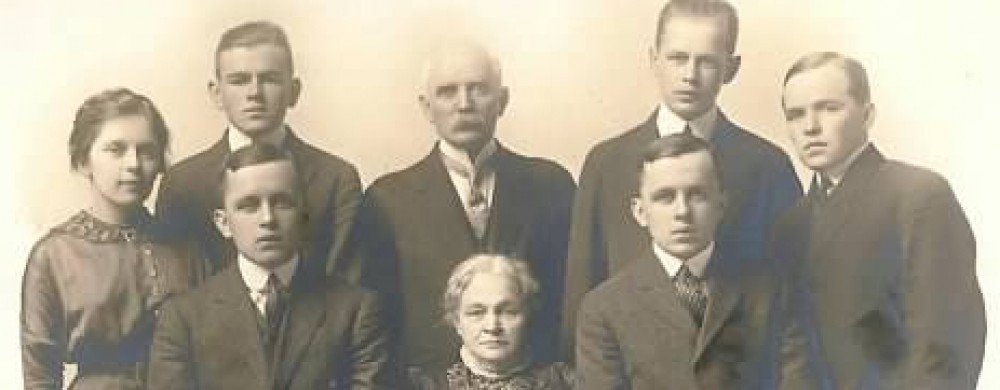The Scourge of the Quakers – A Tyrant’s Rise and Fall
In 1657, George Barlow, a stranger to town with two sons and no wife, swore the Oath of Fidelity in Sandwich, Massachusetts. George declared he was free of legal bond, a member of the church (Congregational, of course), that he would defend the colony and vote on local governance issues. Thus, the forty-something single father, George Barlow met the standard for respectability, but his life prior to this moment seems lived off the record.
It happened that the term for the current Sandwich constable, William Bassett, was coming to an end. On Bassett’s watch, Boston had disturbing reports that Plymouth Colony folks treated strangers with charity and tolerated differing views on Christianity as matters of conscience.
The Puritan masters lived in daily terror of eternal damnation and had documented sightings of Satan. They had reports of Quaker missionaries avoiding Boston for alternative routes into the country, so the government alert level was “code red.” And someone in Boston knew George Barlow was the blunt instrument they needed. On June 1, 1658, the General Court appointed Barlow constable for Sandwich – with a special mandate to harass religious dissenters, – and those who aided them.
The constable was tasked with jailing local offenders, administering punishment, and collecting fines and fees. He was also granted certain powers that included conscripting men to assist him. He could also appraise property and choose what goods to take in forfeiture when people had no money. A perk of the office allowed the constable to pocket ten percent of all monies collected. For a bully like George Barlow, was a dream come true. He could torment Quakers – and anyone else he liked, while making a good living for himself, and earning points with Boston.
A woman addresses an early meeting of Quakers. Few 17th Century minds could deal with the concept of equality.
Knowing their faith forbade them taking oaths (for loyalty belonged to god alone) and to harm others, George targeted Quaker men to conscript as deputies. He knew they must refuse, they wouldn’t fight, and they’d be fined. George impoverished several Sandwich families. From those with no money, George took what would hurt the most, –even to the essentials of living, food, livestock, tools, household goods that included cooking pots. He sent men to prison in Boston, leaving behind women and children to fend off cold, hunger, and likely sexual harassment from…Constable George Barlow.
Prominent Sandwich townspeople sympathized with the persecuted Quakers and helped the affected families. Non-Quakers also refused to serve Barlow as deputies and paid the price. We know of a few men who told George Barlow what they thought of him to his face.
“At the 1 March 1658/9 Court “George Barlow complained against
William Gifford and Edward Perry in an action of defamation…”
Thomas Clark told the court in June 1660 that “G[e]orge Barlow is such an one that he is a shame and reproach to all his masters; and that he… stands convicted and recorded of a lie at Newberry.”
Yet, on October 2, 1660, Boston promoted George to Special Marshal for Sandwich, – and Yarmouth – and Barnstable:
“marshal Gorge Barlow shall have libertie to apprehend ant forraigne Quaker or Quakers in any pte of this Jurisdiction and to be prosecuted according to order provided in that case.”
However, at this point, Barlow’s career had reached its zenith. A few months after his jurisdiction expanded, George himself was fined 20 shillings by the court for cruelty to… wait for it…a Quaker!
George had seized Benjamin Allen and locked him into the stocks at Sandwich overnight – with no legal provocation. He was also cited “for other wronges done by him unto the said Allin.” At the same court session, George was also ordered to return a shirt and other clothing he had taken from Ralph Allen. Additionally, the William Allen family was one of those impoverished, and not because William was a Quaker (at the time), but because he allowed Quakers to hold meetings in his home.
The political tide was turning. The legislature of Massachusetts Bay hanged four Quakers on Boston Common between 1659 and 1661 that included wife, mother and preacher, Mary Dyer. That year, King Charles II “explicitly forbade Massachusetts from executing anyone for professing Quakerism.” [2]
George Barlow was less and less able to pass himself off as respectable by any standard. He drank, he picked fights, he disturbed the peace, and he hauled family members into court. After his term in law enforcement ended and with it, his authority over others, George Barlow faded away. There is no record of the day he died. Ironically, the memory of George Barlow remains alive because of the people he victimized.
The Society of Friends established the oldest continuous monthly meeting in America at Sandwich, Massachusetts and its historians tell a story that is not a literal account, but one that captures the Quaker essence in a charming way. Scott Corbett in his book, Cape Cod’s Way, put it this way:
“At a time when William Allen was in prison in Boston, Barlow paid a visit to the Allen home. He took the cow and all the food he could find, including some given to Mrs. Allen by neighbors. Then for good measure he confiscated the only kettle she had, and leered at her triumphantly. “Now, Priscilla, how will thee cook for thy family and friends? Thee has no kettle.
“George,” said Priscilla, “that God who hears the young ravens when they cry will provide for them. I trust in that God, and I verily believe the time will come when thy necessity will be greater than mine.”
Legend has it that Priscilla Allen was right.
***
Dear Readers, I’m surprised myself to announce a Part 3, George Barlow – The Brute and Bully At Home, is yet to come.
***
[1] Title quote from The American Genealogist; Vol. XXVI, No. 4; October, 1950; Barclay, Mrs. John E.; Ann (Besse) Hallet, Step-Mother of Abigail (Hallet) Alden.
[2] Boston Martyrs – Wikipedia; http://en.wikipedia.org/wiki/Boston_martyrs
Sources:
Sandwich Historical Commission; http://sandwichhistory.org/
Mass Moments: Quakers Outlawed in Plymouth; http://www.massmoments.org/moment.cfm?mid=347
Mary Dyer – Wikipedia; http://en.wikipedia.org/wiki/Mary_Dyer
Boston Martyrs – Wikipedia; http://en.wikipedia.org/wiki/Boston_martyrs
Sandwich Monthly Meeting; http://www.capecodquakers.org/
Title page of book on the persecution of Quakers in New England (1660-1661); http://teachpol.tcnj.edu/amer_pol_hist/thumbnail11.html

